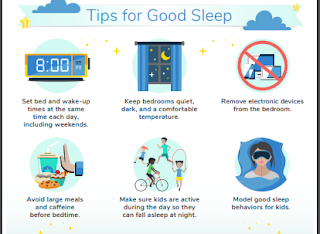Go to bed early for better academic performance
High school students who go to bed between 10 and 11 p.m. get better grades. It confirmed
the relationship between poor academic performance and sleep problems. In particular, having a short sleep and a deficit of a sleep were shown to be the highest predictor for poor school performance. If you struggle with getting to sleep early, try these sleep tips to help you get better rest at night.
Set aside no more than eight hours for sleep. The recommended amount of sleep for a healthy adult is at least seven hours. Most people don't need more than eight hours in bed to be well rested.
Go to bed and get up at the same time every day, including weekends. Being consistent reinforces your body's sleep-wake cycle.
If you don't fall asleep within about 20 minutes of going to bed, leave your bedroom and do something relaxing. Read or listen to soothing music. Go back to bed when you're tired. Repeat as needed, but continue to maintain your sleep schedule and wake-up time.
2.Pay attention to what you eat and drink
Don't go to bed hungry or stuffed. In particular, avoid heavy or large meals within a couple of hours of bedtime. Discomfort might keep you up.
Nicotine, caffeine and alcohol deserve caution, too. The stimulating effects of nicotine and caffeine take hours to wear off and can interfere with sleep. And even though alcohol might make you feel sleepy at first, it can disrupt sleep later in the night.
3. Include physical activity in your daily routine
Regular physical activity can promote better sleep. However, avoid being active too close to bedtime. Spending time outside every day might be helpful, too.



Comments
Post a Comment